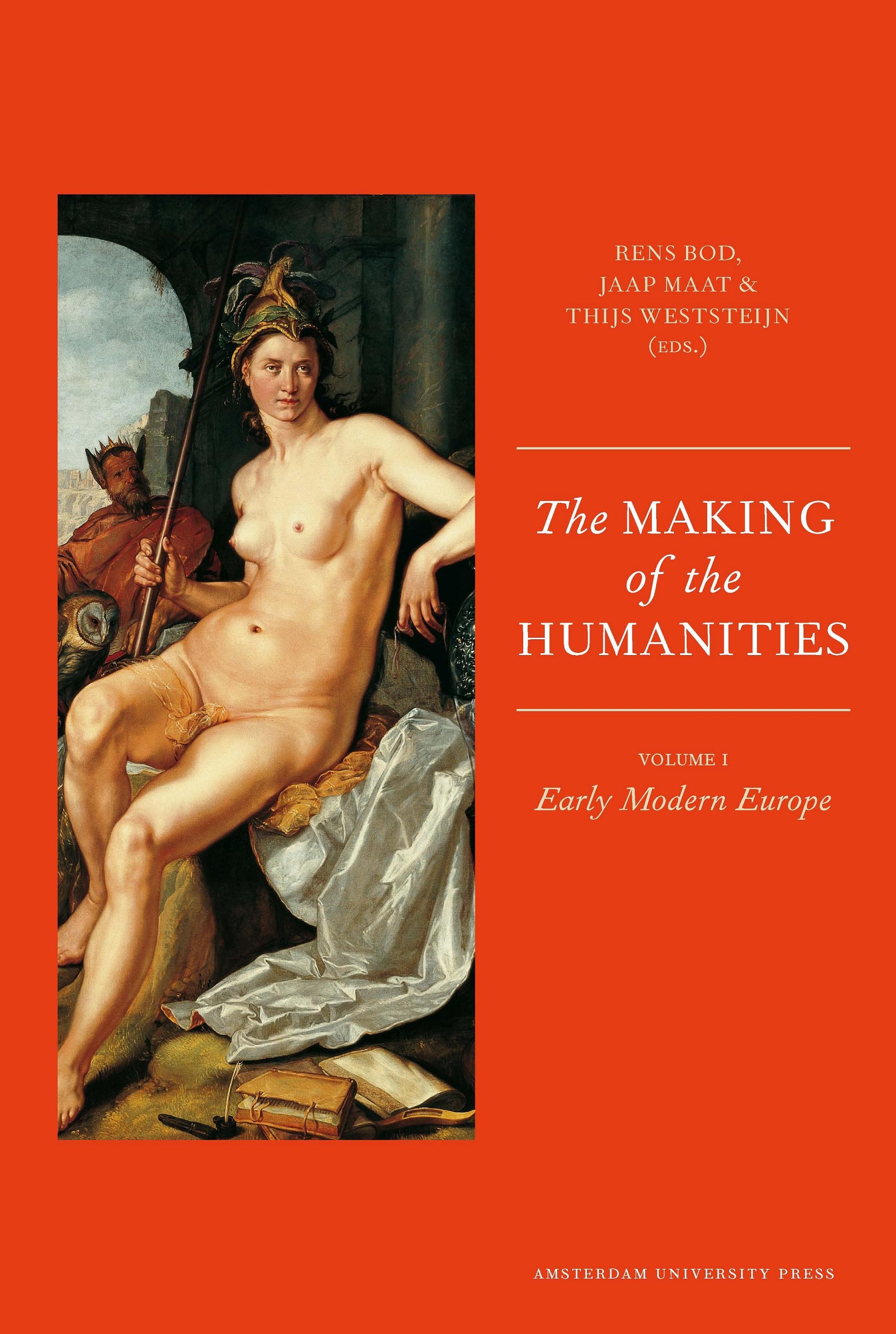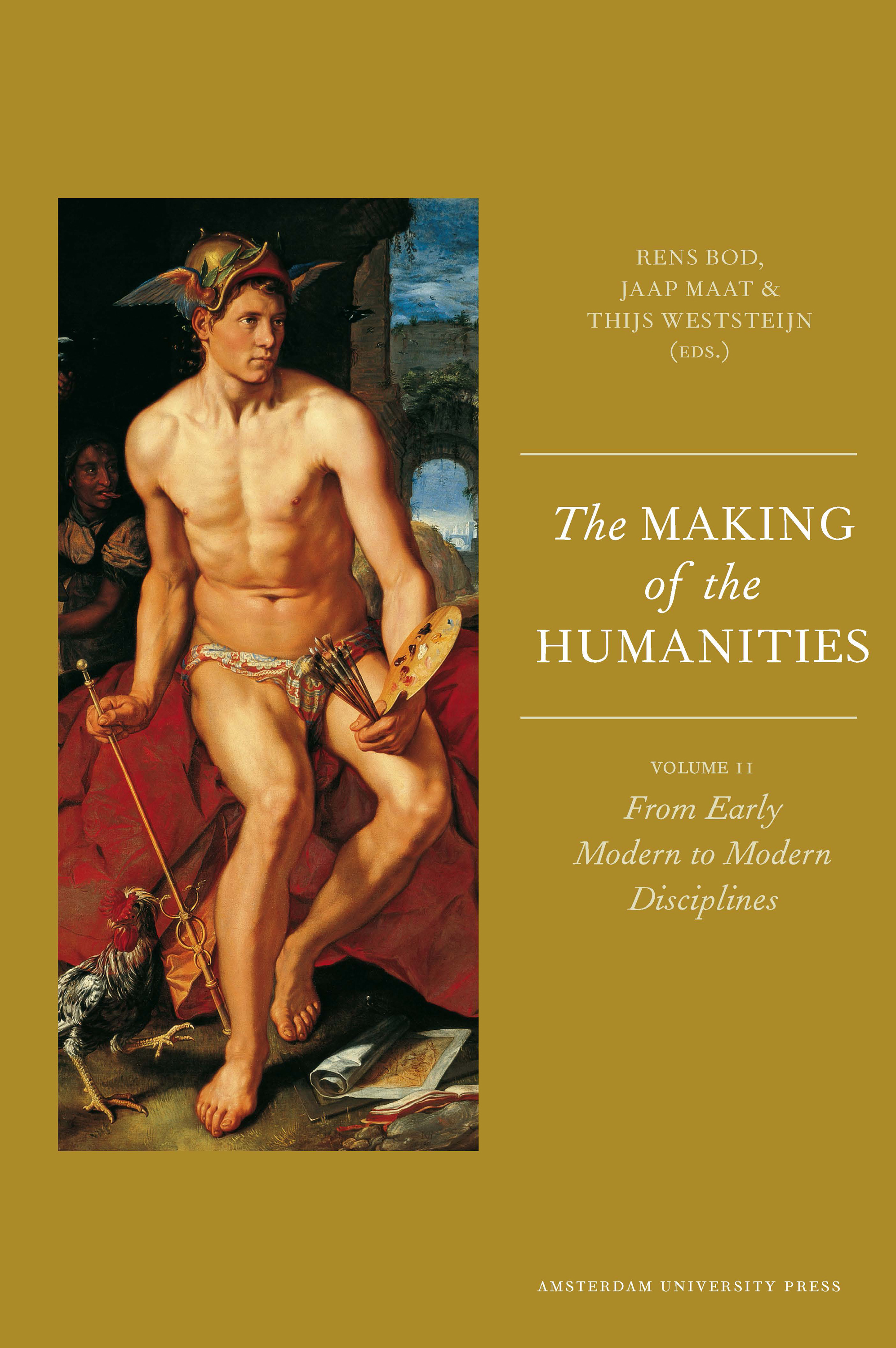Rens Bod, Jaap Maat, Thijs Weststeijn (eds.): The Making of the Humanities, Vols. 1–2 (2010–12)
Filed under book | Tags: · art, art history, historiography, history, history of philosophy, history of science, humanities, language, linguistics, literary theory, logic, musicology, philology, philosophy


“The Making of the Humanities is the first step towards the development of a comparative history of the humanities. Specialists in philology, musicology, art history, linguistics, literary theory, and other disciplines highlight the intertwining of the various fields and their impact on the sciences.
The first volume in the series focuses on the early modern period. Different perspectives reveal how the humanities developed from the ‘liberal arts’, via the curriculum of humanistic schools, to modern disciplines. The authors show in particular how discoveries in the humanities contributed to a secular world view, pointing up connections with the scientific revolution. The main themes are: the humanities versus the sciences; the visual arts as liberal arts; humanism and heresy; language and poetics; linguists and logicians; philology and philosophy; the history of history. Contributions come from a selection of internationally renowned European and American scholars, including Floris Cohen, David Cram, and Ingrid Rowland. The book offers a wealth of insights for specialists, students, and those interested in the humanities in a broad sense.
The second volume investigates the changes in subject, method and institutional context of the humanistic disciplines around 1800, offering a wealth of insights for specialists and students alike. Point of departure is the pivotal question whether there was a paradigm shift in the humanities around 1800 or whether these changes were part of a much longer process. The authors provide an overarching perspective including philology, musicology, art history, linguistics, historiography, philosophy and literary theory. They also make clear that the influence from the East, from the Ottoman Empire to China, was crucial for the development of the European humanistic disciplines.”
Publisher Amsterdam University Press, Amsterdam
Open Access
ISBN 9789089642691 & 9789089644558
400 & 432 pages
Reviews: Sandrine Maufroy (H-Net, 2011, of Vol 1), Anja-Silva Goeing (Renaissance Quarterly, 2012, of Vol 1), Charles G. Nauert (Intellectual History Review, 2012, of Vol 1)
Conference: 2008, 2010.
Publisher: Vol. I, Vol. II.
OAPEN: Vol. I, Vol. II.
Volume I – Early Modern Europe (updated on 2022-12-20)
Volume II – From Early Modern to Modern Disciplines (updated on 2022-12-20)
Volume III
Raymond Queneau: Exercises in Style (1947-) [FR, EN, DE, IT, GR, CZ, ES, PT, RU, PL, ALS, RO, UA]
Filed under book | Tags: · language, linguistics, literature, oulipo

On a crowded bus at midday, Raymond Queneau observes one man accusing another of jostling him deliberately. When a seat is vacated, the first man appropriates it. Later, in another part of town, Queneau sees the man being advised by a friend to sew another button on his overcoat. Exercises in Style retells this apparently unexceptional tale ninety- nine times, employing the sonnet and the alexandrine, “Ze Frrench” and “Cockney”, while an “Abusive” chapter heartily deplores the events.
When Exercises in Style first appeared in French in 1947, it led to Queneau’s election to the highly prestigious Académie Goncourt. This virtuoso set of themes and variations is a linguistic rust-remover, a guide to literary forms, a demonstration of the use of imagery and expletive. But it is far too funny to be merely a pedantic thesis.
The late Raymond Queneau, novelist, poet, mathematician and editor, once told Barbara Wright that of all his books, this was the one he most wished to see translated. He rendered her his “heartiest congratulations”, adding: “I have always thought that nothing is untranslatable. Here is new proof. And it is accomplished with all the intended humour. It has not only linguistic knowledge and ingenuity, it has that.”
Exercices de style (French, transcript, 1947), HTML.
Exercises in Style (English, trans. Barbara Wright, 1958/2012, EPUB, added 2015-5-25; PDF excerpt)
Stilübungen (German, trans. Ludwig Harig and Eugen Helmlé, 1964), Typographic interpretation by Eike Rupp (2008).
Esercizi di stile (Italian, transcript, trans. Umberto Eco, 1983)
Ασκήσεις ύφους (Greek, trans. Achilleas Kyriakides, 1984)
Stylistická cvičení (Czech, excerpt, transcript, trans. Patrik Ouředník, 1985)
Ejercicios de estilo (Spanish, trans. Antonio Fernández Ferrer, 1989)
Exercicios de estilo (Portuguese, trans. Luiz Resende, 1995)
Упражнения в стиле (Russian, transcript,V.A.Petrov et al., 1998)
Styluebige (Züritüütsch, audio excerpt, trans. Felix E. Wyss, 2004)
Ćwiczenia stylistyczne (Polish, trans. Jan Gondowicz, 2005)
Exerciţii de stil (Romanian, trans. Romulus Bucur, Luminiţa Boază and Irina Grădinariu, 2006)
Вправи зі стилю (Ukrainian, trans. Yurko Pozayak and Yaroslav Koval, 2006, HTML, added on 2014-5-26 via Volodymyr Bilyk)
Feel free to contribute more translations and scans in comments.
Comments (3)Michel Foucault: The Order of Things: An Archaeology of Human Sciences (1966–) [FR, IT, ES, EN, SH, DE, RU, PT, GR, TR, RO, ZH, CZ]
Filed under book | Tags: · biology, economics, epistemology, history, language, linguistics, ontology, philosophy, psychoanalysis

“When one defines “order” as a sorting of priorities, it becomes beautifully clear as to what Foucault is doing here. With virtuoso showmanship, he weaves an intensely complex history of thought. He dips into literature, art, economics and even biology in The Order of Things, possibly one of the most significant, yet most overlooked, works of the twentieth century. Eclipsed by his later work on power and discourse, nonetheless it was The Order of Things that established Foucault’s reputation as an intellectual giant. Pirouetting around the outer edge of language, Foucault unsettles the surface of literary writing. In describing the limitations of our usual taxonomies, he opens the door onto a whole new system of thought, one ripe with what he calls “exotic charm”. Intellectual pyrotechnics from the master of critical thinking, this book is crucial reading for those who wish to gain insight into that odd beast called Postmodernism, and a must for any fan of Foucault.”
Publisher Gallimard, Paris, 1966
ISBN 2070224848
404 pages
English edition
With Foreword to the English edition by Michel Foucault
First published by Tavistock Publications, 1970
Publisher Routledge, London/New York, 1989/2005
ISBN 0415267366
422 pages
interview with the author (video, 14 min, 1966, in French)
wikipedia (FR)
wikipedia (EN)
Les mots et les choses. Une archéologie des sciences humaines (French, 1966)
Le parole e le cose. Un’archeologia delle scienze umane (Italian, trans. Emilio Panaitescu, 1967)
Las palabras y las cosas. una arqueología de las ciencias humanas (Spanish, trans. Elsa Cecilia Frost, 1968)
The Order of Things: An Archaeology of Human Sciences (English, trans. unknown, Pantheon Books, 1971, no OCR)
Riječi i stvari. Arheologija humanističkih znanosti (Serbocroatian, trans. Sreten Marić, 1971)
Die Ordnung der Dinge. Eine Archäologie der Humanwissenschaften (German, trans. Ulrich Köppen, 1971/74, 14 MB, no OCR)
Слова и вещи. Археология гуманитарных наук (Russian, trans. В. П. Визгин and Н. С. Автономова, 1977/94)
As Palavras e as Coisas: Uma arqueologia das ciências humanas (Portuguese, trans. Salma Tannus Muchail, 8th ed., 1981/2000)
Οι λέξεις και τα πράγματα. Μια αρχαιολογία των επιστημών του ανθρώπου (Greek, trans. Κωστής Παπαγιώργης, 1986)
The Order of Things: An Archaeology of Human Sciences (English, trans. unknown, Vintage Books, 1971/1994, PDF), EPUB
Kelimeler ve şeyler. Insan bilimlerinin bir arkeolojisi (Turkish, trans. Mehmet Ali Kılıçbay, 2nd ed, 1994/2001)
Cuvintele și Lucrurile, o arheologie a științelor umane (Romanian, trans. Boghdan Ghiu and Mircea Vasilescu, 1996)
词与物 (Chinese, trans. unknown, 2002)
The Order of Things: An Archaeology of Human Sciences (English, trans. unknown, Routledge, 1970/2005)
Slova a věci (Czech, trans. Jan Rubáš, 2007, 51 MB)

